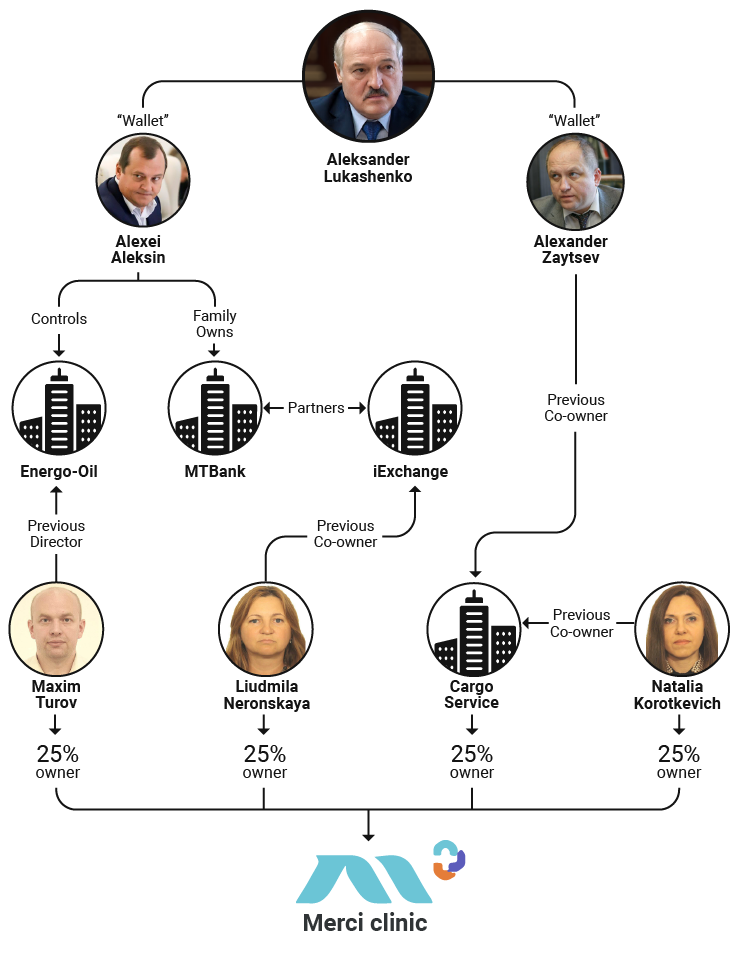The Merci Clinic had been allowed to continue performing imported prosthetic joint implant surgery even after such procedures were effectively halted in state hospitals and private clinics following a crackdown in April on doctors, whom Lukashenko accused of corruption.
The Belarusian Investigative Center (BIC), OCCRP’s member center, reported that Merci Clinic was still providing joint surgeries, but at a much higher price than state facilities had charged.
In May, BIC revealed that the clinic’s owners had ties to Alexei Aleksin and Alexander Zaytsev, who are both sanctioned by the U.S. and European Union for doing business on behalf of Lukashenko’s regime. In July, BIC reported that one of the owners also had a connection to Lukashenko’s family.
Then, on September 15, the government announced that Merci Clinic would be closed. The clinic's phone lines have now been disconnected, and its website says it has suspended business.
The Ministry of Health released a list of violations spanning everything from licensing requirements to improper storage of medications. The ministry added in a statement that Merci Clinic’s supposed violations “may cause harm to state or public interests, life, health, rights and legitimate interests of citizens or create a threat of such harm.”
Merci Clinic opened in 2021 and kept operating even as KGB agents rounded up 35 doctors at other facilities, jailing and fining them.
In a videotaped meeting with government officials, Lukashenko accused the doctors of pushing imported prosthetics on patients in exchange for kickbacks. “There will be no mercy for those who profit from people’s suffering,” he declared. Screenshot of Lukashenko in the meeting videotaped in April. (Photo: Belarusian Telegraph Agency, YouTube, License)
Screenshot of Lukashenko in the meeting videotaped in April. (Photo: Belarusian Telegraph Agency, YouTube, License)
KGB officers also paid visits to medical centers under the guise of inspections. In that climate of fear, state hospitals and private clinics ceased performing joint implant and replacement operations altogether.
Merci was able to capitalize on the situation, becoming the only facility that carried on implanting imported prosthetics –– but at a steep premium. BIC reported that an operation to implant a hip joint made by a foreign manufacturer cost about US$3,000 in Belarus before the crackdown. Merci Clinic was charging $6,500 to $8,000.
Belarusians can choose to have a domestically manufactured prosthesis, which are provided for free. But wait times for those implants are about five years, and doctors say the Belarusian products are inferior.
“At the moment Belarusian prostheses are like dinosaurs,” a Belarusian orthopedic surgeon, who spoke on condition of anonymity, told BIC.
He explained that locally made prostheses had a lifespan two to three times shorter than imports. Patients who received them often came back a few years later with worn-down prostheses that needed to be replaced.
“Any ethical doctor, if a good friend, acquaintance, or someone else came to him, would not recommend the Belarusian prosthesis,” the surgeon told BIC.
For almost six months, Merci Clinic had the monopoly on imports. But people desperate enough to pay such high prices may not have known they were funneling money into the pockets of people linked to Lukashenko’s “wallets,” as Aleksin and Zaytsev are known.
BIC’s investigation showed that all four of the clinic’s owners have business connections to Aleksin or Zaytsev, who have been the subjects of previous OCCRP investigations. One of the owners is also friends with Lukashenko’s daughter in law, and the two even flew by private jet to the United Arab Emirates, where the Belarusian president was meeting with Emirati officials in 2019.
 Graphic by Edin Pašović/OCCRPThe owners of Merci Clinic were able to tap international funding to build the facility. When the clinic opened its doors in January 2021, the Development Bank of the Republic of Belarus announced that its construction and “expensive high-tech equipment” were financed in part by the World Bank.
Graphic by Edin Pašović/OCCRPThe owners of Merci Clinic were able to tap international funding to build the facility. When the clinic opened its doors in January 2021, the Development Bank of the Republic of Belarus announced that its construction and “expensive high-tech equipment” were financed in part by the World Bank.
The World Bank Group told OCCRP that it had provided a credit line “channeled” by Belarus’ Development Bank, which was intended to “improve access to finance for private micro, small and medium enterprises.”
“The World Bank was not directly involved in the identification, approval, appraisal or provision of individual sub-loans,” it said in an email, adding that it halted its Belarus programs in March this year.
BIC’s reporting on Merci Clinic ended up in the courts, which are notoriously biased toward the government. A court in Minsk ruled on August 12 that the stories were extremist material and a security threat. That meant that Belarusians weren’t allowed to access, read, or share the investigation.
Since it was published, however, hospitals and clinics have been allowed to resume prosthetics implant surgeries. And imported joints can now only be purchased through the state enterprise of medical equipment, rather than through individual agents.





